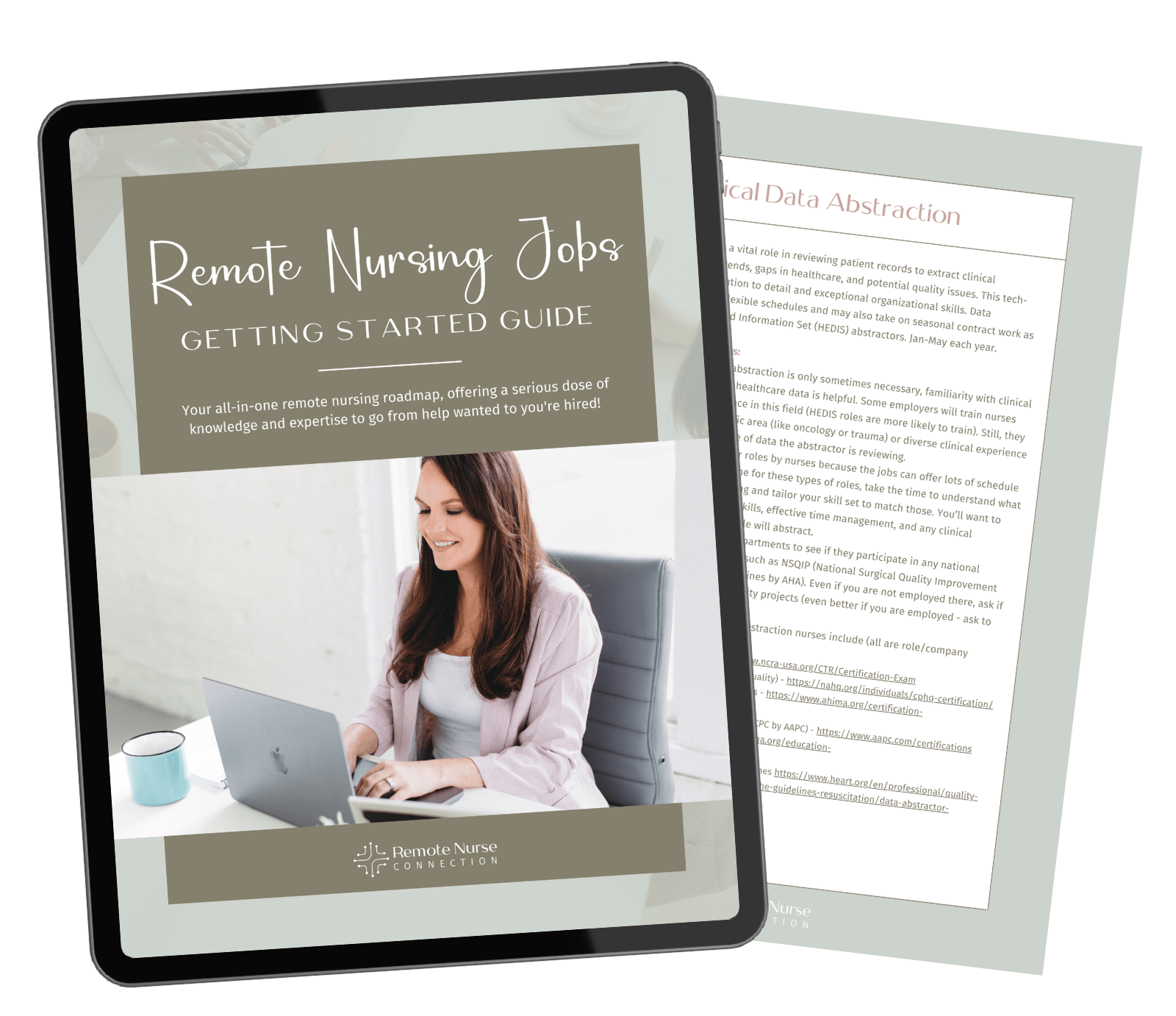
Starting your nursing career and thinking about transitioning into a remote role can feel overwhelming, right? A lot of new nurses wonder, “How can I gain the right experience to get a remote nursing job now?” or “Can I work remote as a new grad nurse?”
Whether you’re fresh out of nursing school or have a year or two under your belt, there are things you can do now to increase your chances of landing that ideal remote job soon. Everyone has a different opinion about newer nurses working remotely but as long as the role is willing to provide training, support, and your skills align with the role, I say, go for it! Let’s dive into some practical strategies that can help boost your resume!
1. Clarify Your Career Path for a Remote Nursing Role
It’s easy to get caught up in just wanting any remote nursing job, but narrowing down your path is key. If you’re applying to jobs without a clear direction, recruiters can often tell, and that might hurt your chances.
Tip for New Nurses: Think about what kind of remote nursing roles match your long-term career goals. Maybe you’re interested in nursing informatics, case management, or telephone triage. Once you know where you’re headed, start looking for opportunities that can act as stepping stones to get there. If you’re not sure what your options are, download the free Getting Started guide.
2. Volunteer and Get Involved
One of the smartest ways to prepare for a remote nursing role is by getting involved and gaining experience in areas that directly translate to nursing role that can be done remotely. Volunteering for committees at your current job, with nursing organizations, or at other non profit organizations to gain experience in different clinical settings (outpatient or physician offices), is a great way to build up your and diversify your skills.
Practical Step: Join committees that focus on things like informatics, quality audits, or data abstraction. You can also look into remote volunteering opportunities with national nursing organizations—these can help you learn to write NCLEX questions, develop educational content or even participate in the development of nursing certification materials. There are several example options listed in the free getting started guide.
3. Stay Open to Stepping Stone Roles
As a newer nurse, you might not land a fully remote job right away, but don’t worry—that doesn’t mean you’re off track. Even experienced nurses have a challenging time landing these roles. Consider roles that give you relevant experience, even if they aren’t 100% remote. Don’t over look nontraditional nursing roles that are onsite or hybrid. Jobs like case management, telephone triage, or utilization review are great pathways to a fully remote role down the road.
Bonus Tip: Be open to temporary or support roles, like Utilization Management Coordinator or Assistant. These types of jobs allow you to build skills, network with those already working remotely, and gain valuable on-the-job experience. You can even start building relationships with key hiring managers!
Freelance Writing: If you like writing, why not start a blog or take on some freelance health and wellness writing gigs? It’s a great way to boost your resume and show off your communication, tech, and time management skills.
4. Invest in Expanding Your Skills
While your clinical experience is important, developing additional skills can really set you apart when applying for remote roles once you land an interview. Certifications and online courses in tech, informatics, or case management can give you a competitive edge.
Certifications & Courses: You don’t need to break the bank to expand your skills. Free platforms like Coursera, Google, or LinkedIn Learning offer great courses on Excel, Microsoft Office, data analytics, SQL, project management, and more. These skills are super valuable for roles in nursing informatics or case management.
For case management or utilization management courses, I recommend Case Management Institute. They offer a free 1 CNE course to help you learn about the difference between CM and UM/UR roles, and they are the only company outside of an employer that has partnered with MCG to give nurses eligibility to take the MCG certification exam (you’ll frequently see MCG knowledge preferred listed in UM/UR job descriptions). There’s even a free quiz to help you decide which remote nursing specialty best suits your personality and skills.
Breaking Into Case Management or Utilization Review?
Most nurses hit a catch-22: employers want MCG/InterQual certification, but you need a job to get trained. Case Management Institute (CMI) solved this problem.
They’re the ONLY organization partnered with MCG Health that lets you get certified before landing the job. After completing their Utilization Management & MCG course, you’ll be eligible to take the MCG Certification Exam, no employer sponsorship needed. Plus, their courses are accredited for nursing continuing education hours.
Ready to break the cycle? Use code ANDREA10 for 10% off your CMI courses.
5. Tailor Your Resume and Cover Letter for Remote Nursing Jobs
A generic resume just won’t cut it. Tailor your resume and cover letter to showcase your applicable skills, certifications, and experiences that are directly relevant to the remote nursing jobs you’re aiming for.
Actionable Tip: Even if you’re a new nurse, highlight transferable skills like communication, tech proficiency, and time management—these are essential for any remote position and can really help you stand out. I’ll share some examples of how to do this next. Caroline, a new grad nurse career coach, wrote this blog post that includes an awesome example of a nursing cover letter.
6. Emphasize Your Transferable Skills
You may not have remote experience or even direct experience in the new role types you’re applying to, but chances are you already have the skills that remote nursing roles require. Focus on emphasizing those transferable skills on your resume.
Example Resume Key Transferable Skills:
Proficiency in EHR systems
- Improved patient HbA1c test compliance by 15% in 3 months by tracking missed appointments in the EHR and initiating follow-up calls and text reminders.
- Contributed to a 20% reduction in unit falls over 3 months by assisting with educating staff on new fall prevention strategies and implementing data tracking protocols using [EHR system] and Excel as part of a unit-based quality improvement project.
Time Management
- Coordinated patient discharges with case managers and social workers, leading to a 20% reduction in readmissions in 3 months by ensuring timely planning and prioritizing discharge tasks for up to 7 patients per shift.
Ability to work independently and prioritize tasks
- Collaborated with interdisciplinary teams to develop a discharge planning process, addressing social determinants of health and independently prioritizing patient needs, reducing readmissions by 20% in 3 months.
7. Network with Remote Nurses
Networking is huge when it comes to finding your first remote job as a nurse. Connecting with experienced nurses and recruiters can give you valuable insights, advice, and even hidden job leads (ones not posted online).
Networking Tip: Join nursing forums, social media groups, or professional associations dedicated to nursing specialties that tend to work remotely. Participate in discussions and ask questions—learning from others who have already transitioned can give you a serious advantage.
8. Build Your Professional Online Presence
I cannot stress this enough. Get on LinkedIn and opitmize your profile for the job you are targeting! An optimzied profile will help recruiters and hiring managers find and connect with you, reducing the amount of time you’ll need to spend searching for jobs. Remember to check your other social media accounts for privacy and professionalism. Yes, recruiters and hiring managers check these sites seeking to learn more about candidates than what is read on their resume.
Practical Step: Update your LinkedIn profile to show off your interest in specific remote nursing roles. Don’t forget to join nursing-related groups and engage in discussions, commenting and sharing posts, to increase your visibility with potential recruiters and hiring managers.
9. Stay Persistent and Positive
It is tough to break into remote nursing, and it probably won’t happen overnight, or maybe even after a month or two. But persistence really does pay off. Keep building your skills, networking, and applying for roles that align with your goals, and you will get there.
Final Tip: Don’t get discouraged if it takes some time. Stay focused on growing your skills and experience, and keep pushing toward that remote nursing role. It’s a marathon, not a sprint, and with dedication, you’ll get there.
Final Thoughts
Landing a remote nursing job might seem challenging at first, but it’s definitely achievable. Focus on developing your transferable skills, get involved in your current role, and keep building your professional network. By staying open to opportunities and continually growing, you’ll increase your chances of landing a rewarding remote nursing job.
Not sure which companies hire bedside nurses without prior experience? Then snag this free guide, which lists 15 Entry-Level Remote Nursing Job Titles, all linked to the company careers page so you can set up job alerts to get notified when that position gets posted! It also includes a cheat sheet of quick, actionable steps for you to take to apply to these jobs, along with resume resources to get you started.
The free job board also has specialty filters to help you quickly narrow down entry level remote nursing jobs [Entry Level and Potential for New Grad Nurse (no nursing license required)].
If you’re looking for more personalized support and resources to save you time, then check out the Premium Membership at Remote Nurse Connection.
Remote Nurse Connection is proudly Ad-free. All opinions are my own. This post may contain affiliate links, which means I’ll receive a commission if you purchase through my link, at no extra cost to you. As an Amazon Associate, I earn from qualifying purchases. Please read full disclosure here.
Browse A Bit More On the Blog…
How to Become an RN Coder (When You’re Not Sure Where to Start)
Apr 8, 2025
I remember when I first started looking into remote nursing jobs. I kept seeing the same phrase over and over again: CPC certification. I had no clue if it was worth getting, or how to become a nurse coder, but the more I researched, the more I noticed a pattern: many...
Remote Nursing Certifications: Which Ones Actually Help You Get Hired?
Mar 10, 2025
One of the first thoughts many nurses have when they’re struggling to land a remote job is, Maybe I need a certification to stand out. I get it; I had that thought, too. But before you spend time and money on something that might not help, let’s talk about whether...

Your Insider Connection to Remote Nursing Success
I help nurses find the best-fit remote jobs that bring flexibility, personal freedom and alignment, and continued professional growth.
CATEGORIES

Free Getting Started Guide
FOR LANDING A
REMOTE NURSING POSITION!


